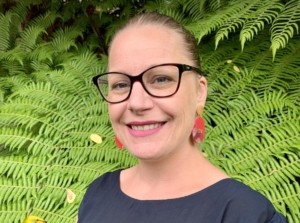
Sarah Elliott
In this feature we interview staff members who have been identified as Early Career Researchers. In the spotlight this month is Sarah Elliott, who is a Social Work Lecturer and the Social Work Site Coordinator on EIT’s Tairāwhiti Campus.
What is your highest qualification and where and when did you finish it?
In 2014 I completed my Masters in Social Work through Auckland University (with first class honours)
What is your role at EIT and what courses do you teach?
I am the Site Coordinator for the Bachelor of Social Work (Tairāwhiti campus) and a social work lecturer on the Bachelor of Social Work (honours) Degree.
What areas do you specialise in?
My social work practice background is in the areas of; human rights and social justice, intellectual disability, chronic conditions, community development and child protection.
Therefore these are also my areas of expertise within teaching.
My speciality papers in terms of the ones I have taught the longest and am most passionate about would align most strongly with my child protection background – ‘Responding to Abuse’ which is level 7 and honours paper, and ‘Family Work’ which is level 6 paper.
What research have you been involved in either last year or this year (please give details)?
Currently undertaking:
I am currently working with a fellow lecturer (from the Hawke’s Bay Campus), Charlotte Chisnell. We are collaborating on ‘The reality of Child Sexual Exploitation (CSE) in an East Coast region of Aotearoa; Exploring the knowledge and experience of child protection social workers.’
This is a primary qualitative research project, utilising focus groups and interviews which will take place with child protection social workers from across Tairāwhiti and Hawke’s Bay, as well as a range of other organisations with a focus on child protection.
The aim is to investigate what knowledge, experience and training social workers, working in child protection, have in relation to CSE, as well as exploring what services and support are currently available for young people who are victims of CSE.
Over the last two years we have studied national and international literature on the subject and presented at numerous conferences.
Currently undertaking:
I am also undertaking research titled ‘Ageing with a bleeding disorder: services and supports’ to establish an accurate view of services currently used by older people with bleeding disorders in Aotearoa. This is being done in conjunction with the Haemophilia Foundation of New Zealand (HFNZ).
This is a mixed methodology research, using a two-phase design consisting of a national anonymous standardised self-report survey then follow up focus groups. All people over the age of 55 years with a bleeding disorder in Aotearoa have been invited to participate in the research, with 41 people choosing to participate.
Participants have the opportunity to share their knowledge and experience which will inform future supports, services, practices and approaches to support other older people with bleeding disorders in Aotearoa.
How important is research to you as an academic?
I see myself as being relatively new to research – it is an exciting space to be in! I am finding that my practice and knowledge are constantly developing as I work alongside more experienced researchers and spend time focusing on this area and building my skills and understanding.
I am also tutoring on our ‘inquiry’ paper which is a research paper for students in their final year of the BSW. The honours students undertake a full research process including gaining ethics approval and interviewing social workers in their respective rohe. Seeing our budding new social workers gaining the skills and knowledge in research (with some going on to publish this in peer reviewed academic journals) is extremely rewarding and also exciting knowing that we are developing their research skills prior to entering practice. I am enjoying supporting them through this process.
How supportive is EIT in encouraging you to do research?
I am supported and encouraged to participate in research and have opportunities to collaborate with others in the social work team as well as across disciplines and in the community.
Recently the BSW held a research showcase in Tairāwhiti – inviting along the social work community, where numerous lecturers (myself included) and community members shared their research and spent time networking and connecting.
I feel fortunate to have the support of a research team at EIT who help guide the process.
